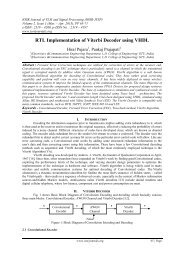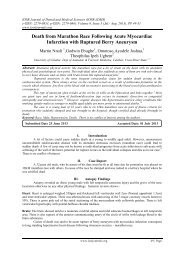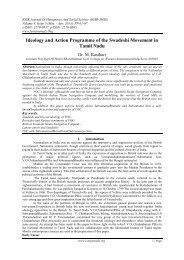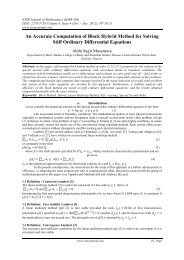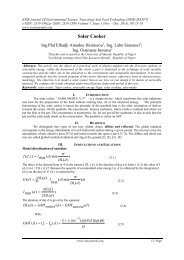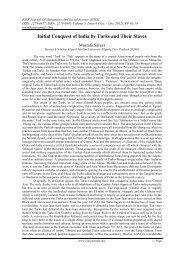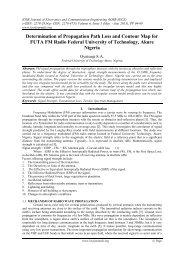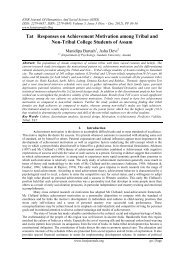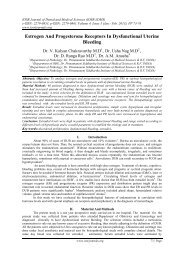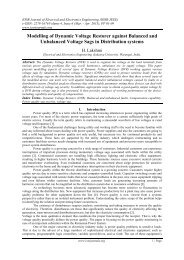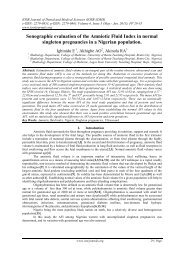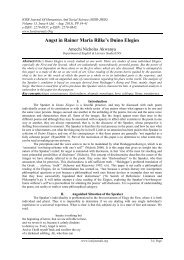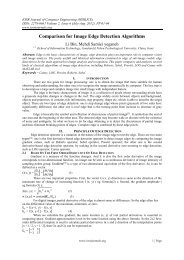Design Compatibility of Classroom Furniture in Urban and ... - IOSR
Design Compatibility of Classroom Furniture in Urban and ... - IOSR
Design Compatibility of Classroom Furniture in Urban and ... - IOSR
Create successful ePaper yourself
Turn your PDF publications into a flip-book with our unique Google optimized e-Paper software.
Placards As A Language Of Civil Protest In Nigeria: A Systemic-Functional Analysis Of The Fuel<br />
favour <strong>of</strong> fuel subsidy removal elicited stiff opposition from a wide segment <strong>of</strong> the Nigerian society. (See Fig.<br />
1).<br />
Apart from the organised labour that vowed to shut down the country should the government make<br />
good its threat, a good number <strong>of</strong> discern<strong>in</strong>g Nigerians saw fuel subsidy removal as the bra<strong>in</strong>child <strong>of</strong> the Bretton<br />
Woods Institutions <strong>in</strong>tended as a neocolonial stratagem to teeter the Nigerian economy irredeemably to the<br />
enslav<strong>in</strong>g apron-str<strong>in</strong>gs <strong>of</strong> the Euroamerican imperialism. It made little sense to them that ord<strong>in</strong>ary Nigerians<br />
should be compelled to subsidise waste, mismanagement, <strong>and</strong> <strong>of</strong>ficial corruption that have become the<br />
trademark <strong>of</strong> Nigeria‟s oil <strong>in</strong>dustry, which brought about importation <strong>of</strong> petroleum products <strong>in</strong> the first place <strong>and</strong><br />
the subsidy that goes with such woeful economic system. Perhaps, the whole fuel subsidy debate would have<br />
made sense if it formed part <strong>of</strong> a larger effort by government to keep faith with market-driven economic<br />
policies, which would have predisposed it to be more accountable, reduce waste <strong>in</strong> public expenditure, conduct<br />
the bus<strong>in</strong>ess <strong>of</strong> government <strong>in</strong> a more sensible <strong>and</strong> bus<strong>in</strong>ess-like manner. Also, the whole argument would have<br />
made even more sense if it formed part <strong>of</strong> an ideological change <strong>in</strong> the direction <strong>of</strong> government policy <strong>in</strong>tended<br />
to <strong>in</strong>stitutionalise a functional market determ<strong>in</strong>ed economy <strong>in</strong> which everyone pays for whatever they want to<br />
enjoy be they political <strong>of</strong>ficials or private citizens <strong>and</strong> conversely dismantle an economic system, which<br />
compels the poor, hapless <strong>in</strong>nocent masses <strong>of</strong> Nigerians to subsidise the filthy comfort, hedonistic extravagance<br />
<strong>and</strong> slothful luxuriance <strong>of</strong> only a t<strong>in</strong>y elitist m<strong>in</strong>ority.<br />
The communication deficit <strong>of</strong> the Jonathan fuel subsidy removal campaign imposed great debilitat<strong>in</strong>g<br />
constra<strong>in</strong>ts on the adm<strong>in</strong>istration‟s propag<strong>and</strong>a team that compelled it to open a debate that confounded rather<br />
than enlightened the Nigerian populace on the tenability <strong>of</strong> its argument. In fail<strong>in</strong>g to expla<strong>in</strong> the kernel <strong>of</strong> the<br />
hysterical chatter about oil subsidy, most <strong>of</strong> the government apologists were content with anchor<strong>in</strong>g their hollow<br />
argument on the fabled existence <strong>of</strong> a cabal <strong>in</strong> the oil <strong>in</strong>dustry that is cart<strong>in</strong>g away billions <strong>of</strong> petro-dollars from<br />
the government <strong>in</strong> the name <strong>of</strong> fuel subsidy, without lift<strong>in</strong>g the veil <strong>of</strong>f the dim-light shadows that erected <strong>and</strong><br />
susta<strong>in</strong>ed the shenanigan octopus or even <strong>of</strong>fer a simple def<strong>in</strong>ition <strong>of</strong> this ex-terrestrial creature called fuel<br />
subsidy.<br />
Apart from the dubious orig<strong>in</strong> which cloned <strong>and</strong> vested the strange animal called fuel subsidy with a<br />
badge <strong>of</strong> <strong>in</strong>fernal liability, there was hardly a consensus on facts <strong>and</strong> figures among advocates <strong>of</strong> subsidy<br />
removal, as they reeled out homologous <strong>and</strong> conflict<strong>in</strong>g figures. The consensus term<strong>in</strong>ated at the viciously<br />
pedestal level <strong>of</strong> a Machiavellian determ<strong>in</strong>ation to get hunger <strong>and</strong> poverty-stricken Nigerians to pay more for<br />
petroleum products so that governments can effectively keep outright bankruptcy at bay <strong>and</strong> get more money to<br />
carry on with the t<strong>in</strong>ker<strong>in</strong>g or trial-<strong>and</strong>-error bus<strong>in</strong>ess <strong>of</strong> governance <strong>in</strong> Nigeria. For <strong>in</strong>stance, the governors had<br />
a different set <strong>of</strong> figures from the Federal Government because they wanted a review <strong>of</strong> the revenue allocation<br />
formula <strong>in</strong> favour <strong>of</strong> the states <strong>and</strong> local council areas. The Nigerian National Petroleum Corporation (NNPC)<br />
also generated a different set <strong>of</strong> unverified figures on the basis <strong>of</strong> which it was alleged to cream <strong>of</strong>f stupendous<br />
sums <strong>of</strong> money from the federation account every month. Perhaps, it was aga<strong>in</strong>st this background <strong>of</strong> discordant<br />
cacophony <strong>and</strong> cerebral confusion that firmly hemmed <strong>in</strong> the misty outl<strong>in</strong>es <strong>of</strong> the fuel subsidy figment.<br />
The forego<strong>in</strong>g represents a tight summary <strong>of</strong> the l<strong>in</strong>guistic messages, which the placards <strong>in</strong> this<br />
category were meant to communicate. In summary, the protesters spoke through their placards: “Jonathan,<br />
reverse fuel subsidy removal because that‟s the only th<strong>in</strong>g we enjoy from the government, we don‟t want<br />
corruption, <strong>and</strong> we are ready to fight it with the last drop <strong>of</strong> our blood.” Before round<strong>in</strong>g <strong>of</strong>f this section, it is<br />
pert<strong>in</strong>ent to note that as the „Occupy Nigeria‟ protest progressed, the debate quickly shifted from the qua<strong>in</strong>t<br />
calculus <strong>of</strong> subsidy removal to more <strong>in</strong>flammable issues <strong>of</strong> grave concern. Protests aga<strong>in</strong>st federal government‟s<br />
decision to end fuel subsidies escalated to <strong>in</strong>clude mass discontent at corruption, mass unemployment, <strong>and</strong> lack<br />
<strong>of</strong> <strong>in</strong>frastructure. Equally <strong>in</strong>terrogated were the nagg<strong>in</strong>g issues <strong>of</strong> governance quality, heavy cost <strong>of</strong> governance,<br />
<strong>and</strong> the beleaguered Nigerian federation, which were either quickly addressed decisively through due process or<br />
the cavalier <strong>and</strong> radical path <strong>of</strong> revolution. In the subsequent sub-sections, we shall address these different but<br />
related themes as overtly advertised by the protesters‟ placards.<br />
3.2 Corruption<br />
The placards <strong>in</strong> this category have corruption as their theme. (See Fig. 2). Every simple sentence has a<br />
theme (Brown & Yule (1983) or what Mathesius (1942) refers to as „the start<strong>in</strong>g po<strong>in</strong>t <strong>of</strong> the utterance‟ <strong>and</strong> a<br />
rheme, everyth<strong>in</strong>g else that follows <strong>in</strong> the sentence, which consists <strong>of</strong> „what the speaker states about or <strong>in</strong> regard<br />
to, the start<strong>in</strong>g po<strong>in</strong>t <strong>of</strong> the utterance. The theme, then, is what speakers / writers use <strong>and</strong> what Halliday (1967:<br />
212) calls a „po<strong>in</strong>t <strong>of</strong> departure. From the nature <strong>and</strong> content <strong>of</strong> the placards, there exists a wide variety <strong>of</strong><br />
syntactic forms, which the protesters used to convey the same propositional or cognitive content. Whether it is<br />
„Kill corruption, not Nigerians,‟ „tackle corruption <strong>and</strong> cut cost before remov<strong>in</strong>g fuel subsidy‟ or „Expose<br />
corruption,‟ the same propositional content is expressed each time. In almost all the cases, the protesters asserted<br />
through their placards that corruption is the pivot around which all other national development challenges<br />
revolve. Dismantle the ulcerous bugbear <strong>and</strong> the rest aspects <strong>of</strong> our national life would be automatically fixed,<br />
www.iosrjournals.org<br />
19 | Page



